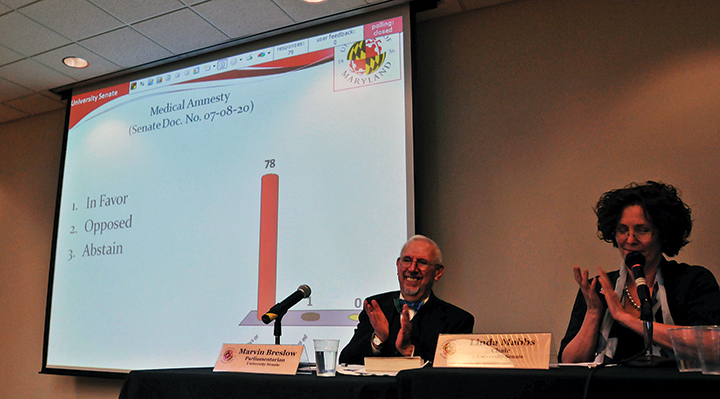
Parliamentarian Marvin Breslow and Senate Chair Linda Mabbs applaud as the Good Samaritan policy passes in 2011. The new bill would include protections against drug use.
It’s been a six-year uphill battle, but some students may soon see through the final push to a comprehensive Good Samaritan policy — one that seemed unimaginable just a couple of years ago.
Student activists who first proposed the policy — which would protect students from university sanctions if they call 911 for a dangerously drunk friend or themselves — initially hoped to see a policy that included drug use. But when that proved to be too difficult, the bill’s supporters focused on a policy that only included alcohol, which passed the University Senate nearly two years ago.
Now, after many of the bill’s initial sponsors have graduated, a group of students may come one step closer to seeing that initial vision come to fruition. The Senate Executive Committee will decide at its meeting tomorrow whether to send the bill, which now includes protections against drugs, to the full body for an up-or-down vote next month.
Brandon Levey, a 2012 graduate who now works as the Criminal Justice Policy Foundation’s chief of staff in Silver Spring, introduced the initial expansion bill in the fall of 2011 while he was an undergraduate senator with the aim of protecting more students.
“Saving lives needs to be the most important goal of the university,” Levey said. “If there’s something that’s preventing the saving of lives, then we have to take action to make sure that lives can be saved.”
Although senators opposed the idea in the past, saying students would abuse the policy or that such a policy wasn’t necessary, many have since said their priority is ensuring students feel comfortable calling for help.
“What’s most crucial for us as educators, for students and being good colleagues … is that we have students’ safety in mind,” said senate Chairwoman Martha Nell Smith, who has not taken a stance on the expansion. “And I would not want any student to feel, if he or she had been doing whatever, that they couldn’t call EMS if another student was in trouble, or to feel hesitant about calling.”
And students are largely supportive of a more inclusive policy, said Amanda Long, the Health Center’s coordinator of alcohol programs.
“What I hear from students is that it’s a very positive thing,” Long said, “that it does encourage them to make the responsible decision if they’re ever in a situation where help needs to be called.”
But even if the bill in its current form does make its way to university President Wallace Loh’s desk, Levey said there’s still more to be done, including additional “dangerous” drugs.
Some law enforcement officials, however, have expressed concern that an expansion will take the policy too far.
“Where possession of alcohol underage is a civil violation of law, moving into unlawful drug violation is criminal,” University Police spokesman Capt. Marc Limansky told The Diamondback last year. “It’s kind of crossing over a line.”
The bill has since undergone a 10-month review in the senate’s Student Conduct Committee, which included receiving an opinion from state Attorney General Doug Gansler, who said implementing an expanded Good Samaritan policy would not violate state law.
Long said if the policy were to cover other drugs, the spirit of the current Good Samaritan rule would apply in a similar way.
“The thought behind creating such a program is that it encourages students to make the call in the event that someone’s in danger and needed to go the hospital,” she said. “If the policy were enacted, the spirit of the policy would encourage students to be more responsible.”
Tomorrow’s committee meeting is set for 1 p.m. in Marie Mount Hall. Other items on the agenda include withdrawal policy, sexual assault education and smoking ban legislation.



